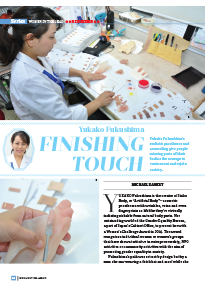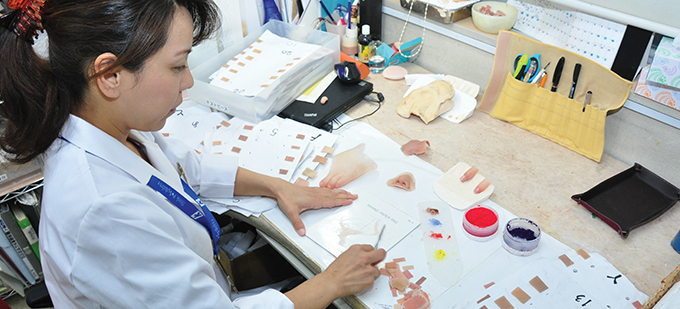Home > Highlighting JAPAN >Highlighting Japan June 2015>Women in the Lead
Highlighting JAPAN

Women in the Lead
Yukako Fukushima
Finishing Touch
Yukako Fukushima’s realistic prostheses and counseling give people missing parts of their bodies the courage to venture out and rejoin society.

Yukako Fukushima is the creator of Jinko Body, or “Artificial Body”—cosmetic prostheses with wrinkles, veins and even fingerprints so lifelike they’re virtually indistinguishable from natural body parts. Her outstanding work led the Gender Equality Bureau, a part of Japan’s Cabinet Office, to present her with a Women’s Challenge Award in 2014. The award recognizes individual women or women’s groups that have shown initiative in entrepreneurship, NPO activities or community activities with the aim of promoting gender equality in society.
Fukushima’s path was set not by design but by a man she saw wearing a thick hat and scarf while she was in a hospital waiting room one summer. “I just went up to him and said, ‘Aren’t you hot? Why are you wearing a scarf?’ ” she recalls, admitting she was never very shy.
As it turned out, the man had lost his nose and both ears in a workplace explosion that also left him severely burned. “Japan is very closed, so we hide things,” Fukushima says, illustrating the point with tales of clients who were afraid to leave their homes lest people notice their missing hand, or who wouldn’t marry for fear of revealing a missing foot. “The reality is that a lot of Japanese people are sensitive about it.”
She told the man she would help, saying “I’ll make you something so you can at least wear a pollen mask and stop wearing that scarf.” Then a 21-year-old business school graduate who’d specialized in hotel services, she made him a simple set of ears consisting of little more than a pair of knobs made from whatever pliable material she could find. Fukushima, now in her mid-forties, grimaces as she recalls experimenting with everything from double-sided tape to a variety of types of glue to attach the prostheses. But when she saw how pleased the man was just to be able to breathe more easily, she decided to apply her childhood affinity for art and sculpture to carving a realistic set of ears out of modeling clay, painting them to be as lifelike as possible. Word of her ability spread, and to her surprise, orders began to come in.
An entrepreneurial firm soon picked up Fukushima’s creations but folded just as quickly, leaving her with a mountain of orders but no capital. She took out loans and worked for four years to fill the backlog, teaching herself to make cosmetic fingers, noses, eyes, breasts, hands and feet—whatever her clients needed—as she learned to shape and color high-quality silicone to match as many as twelve hundred skin tone variations.
As new orders came in, instead of raising her prices Fukushima lowered them significantly. “People without hands, or who’ve lost their legs in accidents, have also often lost their jobs, so they have no money at the time,” she explains.
In 1999, Fukushima allowed her small company to be acquired by Kawamura Gishi Co., Ltd., an established prosthesis maker based in Osaka. She maintains her own office and workshop at Kawamura. While she occasionally does media appearances to raise awareness, Fukushima prefers to focus on her workshop. “I don’t have enough time. Clients come every day, and some are kept waiting as long as two months.”
Secured by elastic tension, braces or special glue, Jinko Body prostheses are not only comfortable to wear but robust enough that they can be used while swimming or in hot springs. Yet Fukushima, who is also certified as a psychological counselor, is equally concerned about helping her clients accept themselves as they are. “I’d like to see even more positive environments where people can accept one another’s differences,” she says.
© 2009 Cabinet Office, Government of Japan






